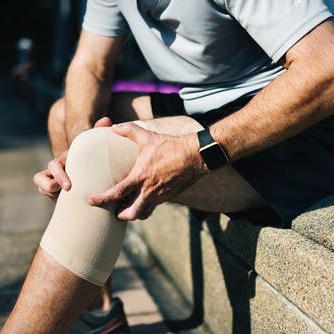
New robotic system helps orthopedic surgeons increase accuracy
Orthopedic surgeons performing knee replacement surgery at Montefiore Nyack Hospital now have a new tool—a robotic system to help them plan and perform surgery. “The robot helps us be more accurate, with less variation in results,” said Jordan Simon, MD, Director of The Joint Replacement Center at Montefiore Nyack Hospital. “This can lead to a more comfortable knee and a quicker recovery.”
Patients coming to Montefiore Nyack Hospital for a knee replacement will have good results whether they have traditional knee surgery or robot-assisted surgery, Dr. Simon said.
With robotic knee surgery, the robot is not performing the surgery. The procedure is performed entirely by the surgeon, using the robot as a tool to improve the accuracy of the cutting instruments.
Before the procedure, the patient has a specialized X-ray, which the robotic system uses to generate a 3-D image the surgeon uses to plan the surgery. This eliminates the need for a CT or MRI before the operation.
The robotic system uses a camera and optical trackers attached to the leg to know exactly where the patient’s knee is in space—like a GPS. Throughout the surgery, the robot provides data about the knee. This information helps the surgeon ensure the knee implant is properly positioned for the patient’s body.
In any knee replacement surgery, the surgeon must cut both the bone and the soft tissue surrounding the knee. As deformity of the knee is corrected, the soft tissue around the joint has to be re-balanced correctly by the surgeon—making sure it’s not too loose or tight. If this doesn’t happen, it will result in pain, instability and potential restricted range of movement.
The robot helps the surgeon assess the state of the soft tissue and planned bone cuts can be adjusted before the actual cuts are made, so less rebalancing is needed. “This leads to a better range of motion in the knee and a quicker recovery,” Dr. Simon said.
What to Expect With Knee Replacement
Whether you have traditional or robotic knee surgery, you will be up and walking the same day as the surgery. “Many patients go home the next morning,” Dr. Simon said. Patients have physical therapy at home two or three times a week for two weeks, then start going to PT outside the home. A full recovery generally takes eight to 12 weeks on average.
Pain control for knee surgery is much better today than in the past, Dr. Simon noted. “The patient won’t have much pain the day of surgery. Then they will be given enough medications to control pain so they can recover quickly.” Many people use narcotic pain medications for three to four weeks after surgery, then switch to non-narcotic pain medications. By six to eight weeks after surgery, they usually are taking over-the-counter pain medications.
Most knee replacements last more than 15 years, Dr. Simon said. “We don’t know yet whether robot-assisted surgery leads to a longer life of the knee,” he said. “Regardless of what type of surgery patients have, a new knee will help them get back to the activities they enjoy.”
For more information, visit montefiorenyack.org/joint-replacement. To schedule a consultation, call The Joint Replacement Center at Montefiore Nyack Hospital at 845-348-7489. Our staff will answer your questions and provide a list of surgeons.



 Upcoming Events
Upcoming Events



